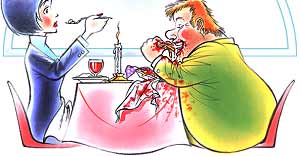 |
|
||||||||||||
|
Columns by Nancy K. Austin: Everyone's a Critic... Even You
List all of Nancy's columns
Visit our other Getting Work Columnist
|
My dear almond clusters! It has come to this columnist's notice that some of you are flustered -- indeed, positively flummoxed -- by the very idea that you might soon be hosting a mealtime meeting with a potential client. And who can blame you? You've got plenty more than gastronomy to worry about: How will you keep the conversation going, and what if you can't think of a single sparkling thing to say? Where should the meal take place? Can you eat with your hands? Is it wise to brush up on the Heimlich Maneuver, just in case? Who pays? And when do you get around to the main course -- asking for the guy's business? Is it best done before the Port-Salut, or should you hold off until you've shown the cherry tomatoes who's boss? But please don't panic, jellybeans, because I have it in mind to steer you clear of monstrous gaffes and other breaches of sensibility and good taste. All you have to do is learn a few fundamentals, keep your elbows off the table, the spinach out of your teeth, and your sense of humor in good repair. Business Manners Are Different From Social Manners If you've ever held open a door for a businesswoman and received a markedly chilly response, you learned this one the hard way. Chivalry's not dead, it just doesn't work at work. "A man who treats a female client in a chivalrous manner will be perceived as condescending," cautions New York-based etiquette coach Hilka Klinkenberg, whose company, Etiquette International, teaches people to mind their manners at work and at home. "Business etiquette has military origins; it is based on hierarchy and power," Klinkenberg points out. "So if somebody's helping her all the time, the implication is she's less than competent." As a rule, Klinkenberg suggests you "hold the door open for a woman if you would hold it open for a man in the same situation." If you're a woman IP and your prospect happens to be a man, getting the door for him is a simple token of respect for your guest. If he's hopelessly old-school and insists on ushering you through first, don't pitch a fit or gripe that Alice doesn't live here anymore. Accept graciously, say thank you, and carry on. An IP's Manners Matter More Than a Wage Slave's This news flash will come as a shock if you're someone who's gotten used to working from home in your ratty old jammies where you can pork out on Pringles and string cheese with nobody the wiser. Might as well face it, eventually you'll have to wear real clothes, comb your hair, and hold up your end of a face-to-face conversation, just like a grown-up. "When a soloist is rough around the edges," Klinkenberg says, "it's everything, because your image is everything. But if you encounter one person at IBM who's less than polished, you don't think less of IBM," although you might shake your head at how such a nerfball slipped through IBM's notoriously image-sensitive screening process. Not that you should turn into Sam Slick, but the way you present yourself does serve as a kind of Rorschach for how you're going to handle bigger things later on. "We're constantly being judged, even when we are unaware of it," Klinkenberg says. "Good manners and polish open doors: We assume that people with excellent manners are savvy about other matters, too." Of course, the opposite is also true. If you slobber all over a prospect but unthinkingly snub your waiter at lunch, your would-be client takes note of this unconscious clue to your character and concludes you'd pull the same snooty stunt with her underlings. Your credentials may be impeccable, but think she'd hire you? Fugeddaboutit. Breakfast, Lunch, or Dinner? Okay, you've chosen your chow-time prospect. Now, which meal best suits your purposes? Try a breakfast meeting when "your business is urgent, to review something happening that day, or to see people who don't do lunch," Klinkenberg says. "Otherwise, you're making somebody get up early to meet you, and you're intruding on private time." Lunch is a perennial favorite for establishing business contacts, and it's an especially good setting for co-ed get-togethers. Save the high-profile business dinners for cementing relationships or entertaining out-of-towners. Unless you absolutely cannot sidestep it, don't meet a prospect for the first time over dinner. It's tough enough to get down to business without having to do it on such a large scale. Now we have a veddy proper new option you might find charming and effective: Afternoon tea. Our etiquette coach approves, calling tea "the new power meal. It's civilized, an ideal time to become better acquainted with someone with whom you want to establish a business relationship." As always, let your prospect's preferences win through, and don't force the issue. I bet you could name a couple of contacts who think Earl Grey is the lead checker down at the local Safeway, but some people will be thrilled to death by a late afternoon scone-fest. It's your job to find out what grabs him -- Italian, French, Chinese? Swift or slow food? Suppose he tells you he's crazy about this burger joint around the corner? Then that's where you go. Business etiquette does not demand white linen and five stars. If you ask me, a hand-made cheeseburger from the incomparable In-N-Out (when you're in California) is a billion times better than a fancy finger-bowl affair at a continental restaurant, but hey, it's your party. Get a Plan, Stan Okay, my crumpets, you've got your meal-mate, the right spot, the day, the time. Now what? If this is the sort of eating place that takes reservations, for heaven's sake, don't wing it, hurry up and make one. If you've never been to the restaurant (which means they don't know you from a can of Spaghetti-Os), reconnoiter. "Go over there early the same day, and introduce yourself to the maitre d' or host," Klinkenberg says. By the time you and your prospect show up, they'll recognize you and address you by name as you're escorted to your table. Always check things out ahead of time, even if you're only toodling over to the local Taco Bell. Street or valet parking? Vegetarian dishes? Quiet enough to talk the talk? (Never let them seat you near the kitchen.) Locate the restrooms, and make sure they're spick-and-span. Ask to see the menu. Make sure there's something for a variety of tastes. If you go to one of those high-falutin' places that lists prices only on the menus they give to male diners, find another eatery or politely request that all menus at your table include prices. Patiently explain that women are a lot stronger than they look. You're the Host, You Pay the Check If you're like many of your fellow IPs, your lunch money is your marketing budget. So when your guest munificently offers to split the check, you might be sorely tempted to take him up on it. Wrong. You're the one vying for the business, and it's up to you to pay the tab. I probably don't need to mention this, but this rule holds for women, too. Don't let your male prospect seize the bill because that's what men do. To avoid a scene, pre-pay the bill; that way, it's never even brought to the table. Or, do as etiquette coach Klinkenberg suggests, and make it clear that you're the emcee when you extend your invitation. Try saying something like "I'd like you to be my guest at lunch on Wednesday." It's perfectly appropriate to go halvsies when your prospect works for a company with a no-gift policy so stringent it includes meals. But if you've done your homework, you'll know that and will have planned for it, so you'll be spared a battle for the bill. And since the Internal Revenue Service stopped requiring receipts for business meals, travel, and entertainment for expenses under $75, you can concentrate fully on your prospect instead of the looming paperwork. Help: I Can't Think of Anything to Say! In her New Complete Guide to Executive Manners, the splendid Letitia Baldrige, who's written a dozen books about manners and served as Chief of Staff to Jacqueline Kennedy, notes that the key to diplomacy is to "act interested in what people are saying around you, even if you're not." With hundreds of formal diplomatic dinners under her belt, she knows what she's talking about. Listening, in other words, is the basis for all good conversation, not to mention learning. It is also a sign of respect, even when you're nonplused about the subject matter. The quickest way to put an end to a business meal -- and a sale -- is to flub it as a listener. Sure, you have an agenda and you need to get to it, but don't rush. Remember this rule: Never talk serious business before the appetizer. If your companion has been prattling on for the last 10 minutes about the telltale signs of impending gum disease or the mind-boggling array of deadly scalp diseases in North America, don't interrupt, no matter how green about the gills you become. Wait for a little break in this delightful discourse, and then steer the conversation in a new direction. If they're clearing away your empty plates and you want to keep the dialogue going, order dessert; it buys you another 20 minutes. Be people-smart: Give the one you're with your full attention; don't let your eyes wander around the room, and don't let yourself be swept away if a more attractive prospect shows up. Don't tap your toes or fidget in your chair. Come to lunch armed with several interesting topics (other than yourself or your business). Develop the knack of asking questions without being a pain. Learn how to pay a compliment without brown-nosing. A business lunch is never about lunch, it's about business. It's the perfect place to kick off a relationship or close a deal, but by all means, save your PowerPoint presentations, handouts, and flipcharts for the conference table, not the corner café. The same goes for big-time, bet-the-farm proposals, which belong in meeting rooms -- places where you have climate control, adequate lighting, and fewer interruptions. Heed the advice above, and next time somebody says, "Hey, let's do lunch," they'll really mean it. |
||||
|
We'd love to hear your feedback about this column, or put you in touch with Nancy K. Austin if you like. You may also like to see her biography. Illustration by Steve Smallwood. |
|||||
The 1099 name and logo are trademarks of 1099 Magazine.



